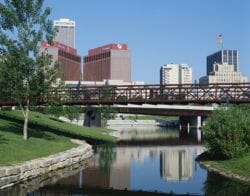Nebraska Atlas
Online Atlas > Nebraska > Museums • Photographs
Nebraska facts and history plus travel and tourism information.
Capital: Lincoln
Abbreviations: NE (postal), Nebr.
Area: 77,358 square miles
State Bird: Western Meadowlark
State Tree: Cottonwood
State Flower: Goldenrod
State Motto: Equality Before the Law
Nicknames: The Cornhusker State, The Beef State, The Tree Planter State
Skyline of Omaha
Located on the central Great Plains, Nebraska is a largely rural state whose land is devoted to agriculture. Nebraska's chief crops include corn and soybeans, while its primary livestock products are beef and pork. Once considered part of the Great American Desert, irrigation systems have dramatically increased the land's arability.
Before Nebraska became the 37th state on March 1, 1867, the region's population was dominated by the Missouri, Omaha, Oto, Pawnee, and Ponca tribes. The Oregon Trail was blazed in 1841, but only missionaries, fur traders, and Indian agents initially used the trail. By 1843, westward travelers were following the Oregon Trail through Nebraska. Settlers began claiming land within Nebraska when the area became a territory in 1854, the 1862 Homestead Act offered free land, and railroads arrived in 1865.
Tourists enjoy exploring the historical trails in Nebraska and several sites associated with them, namely: Chimney Rock, Scotts Bluff, Homestead National Monument, and Fort Robinson. The Toadstool Geological Park and Pine Ridge in the northwest, the Sandhills, and Agate Fossil Beds are also of interest, and Omaha is Nebraska's largest city.
Nebraska Map

Nebraska Links
- Nebraska Government - official Nebraska state website.
- Nebraska Division of Travel and Tourism - Nebraska travel and tourism.
- National Parks in Nebraska
- Nebraska QuickFacts - from the US Census Bureau.
- 50States.com - Nebraska
Nebraska Resources
- Nebraska Real Estate - real estate information about Nebraska.
- Nebraska Colleges and Universities - higher education institutions in Nebraska.
- Nebraska Libraries - list of libraries in Nebraska.
All rights reserved.
For your convenience, each external link will open in a new window.
